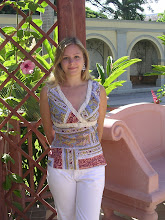Ricky, Headmaster Lu, and I enter a small restaurant (and by small, I mean there are three tables). I have eaten here before and like the family that owns the place. It is a couple with three children--something nearly unheard of in China so it can be surmised that they have some connections in the government. We sit down and immediately the headmaster lights up a cigarette. The wife gives us the menu and the husband goes in the back to prepare to cook.
"What do you want to eat?" Ricky asks me.
I give him a disbelieving look. "You know I can't read the menu."
He orders three dishes, an egg, pork, and mushroom dish, sweet and sour pork, and a potato dish. He also orders three beers. The beers are cold rather than the usual slightly-chilled temperature for which I am grateful because it has been a hot day and a feebly rotating table-fan is the only relief in the restaurant. We pour a little into our 3-inch-high glasses, “cheers” each other and drink.
I look at Headmaster Lu and he smiles at me. This is about the only way we can communicate without Ricky's assistance. I know he likes me--he has told me I have good habits. By this he means he appreciates that I show up to work on time, have my lessons prepared and am dressed nicely. Ricky also tells me that it is noticed that I am a good housekeeper. Some of the other foreign teachers hire a housekeeper to do their cleaning and laundry. "You come from a good family," the headmaster says. I agree with him. "Both of my parents work very hard," I tell him. I ask him to tell me about his family.
"I have a daughter," he explains through Ricky, "she is your age. And I have a son who is twenty-nine."
"How old are you?" I ask.
"liu-shi-wu," he says, sixty-five. His mother is eighty-four. "She is very strong. She goes for a walk everyday after dinner. You must exercise if you want to stay healthy," he states as he lights up another cigarette. Other than some facial lines and tobacco-stained teeth, he looks much younger. He is a tall man and fairly lanky. His hair is still black though a few gray strands can be spotted. His eyes are rounder than many of the Chinese and his complextion is fairly tanned indicating that he spends a lot of time outside. Later, I will learn that he has a small garden outside his apartment in Anshan where he grows some flowers and vegetables.
"Have you always lived in the Liaoning Province?" I ask him.
"Yes. My family was very poor. We all slept in one room. I went to Sunyi High School. Then I went to the university in Anshan. Then I became a high school teacher. Later, the government asked me to teach at the teacher’s college. Then I returned to be headmaster at the school." Sunyi High School is the name of the high school I teach at. I tell him I didn't realize it was that old and I ask him if he was a good student. "Dui," he replies, yes.
I ask him to tell me what Taian was like when he was a boy. He explains that when he was born, the Japanese occupied this part of China. "China was very poor then. Mao Zedong told us to work hard and make a better life."
"Will you tell me about Mao?" I ask. I'm not sure if it is polite of me to do so but he seemed eager enough.
"Mao was from a poor family. He was in the army and worked very hard. He told the people to make China great and we worked very hard. Now we have a lot of food to eat," he indicated our dishes, "but there are a lot of people in China to feed. Some people are still poor. We are still working hard to make China great--to make Mao's dream come true. Mao Zedong admired America's George Washington."
"Yes," I tell him, "I can understand why."
"Later in life," the headmaster continues, "Mao made a mistake. He trusted the wrong people." I ponder this point. I have noticed that the Chinese tend to have a hard time trusting others. Our office is padlocked whenever we are not there, my friend wanted to walk on the other side of the street with me when some people were trying to ask her questions, store attendants will follow customers around while they are shopping, and I'm not supposed to go out by myself after dark are a few examples I have seen of mistrust.
Still, there is a cheery innocence here that I have not observed in America. "The Chinese are very happy people," I say. "Do you think this is because there are still people who remember what it was like to be very poor?"
He seems to think about this but is not sure how to answer. "We will teach our children to appreciate what they have," he says finally. He lifts his glass to me, "gan bei," he toasts, bottoms-up.
Subscribe to:
Post Comments (Atom)


1 comment:
A good story. Keep it up, Audra. You are making a difference.
Post a Comment